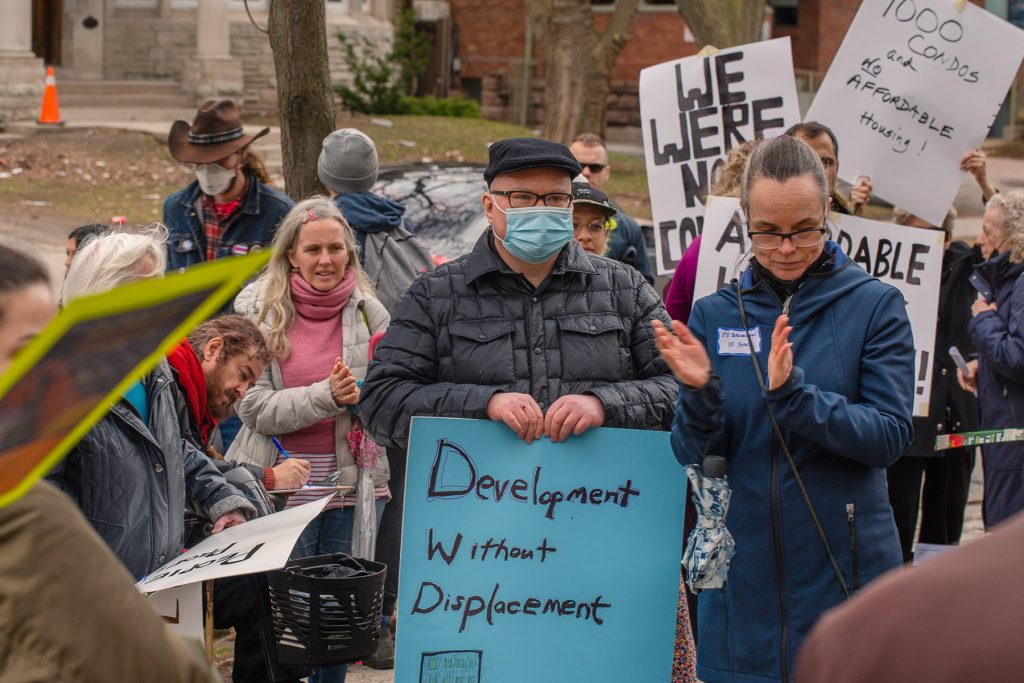145 St. George has become poster child for renters facing eviction

By Carly Penrose
On April 1, close to 80 people gathered outside a mid-rise apartment building at 25 St. Mary St. with name tags displaying their building of residence and the length of their occupancy. Their timelines ranged from a few years to multiple decades in one of three apartment buildings that will be demolished to make way for higher-density condominium towers. The event was organized by the buildings’ tenants’ associations and the Federation of Metro Tenants Associations (FMTA) and is the first of a series of planned demonstrations.
Rebecca Gimmi, a resident of 145 St. George St., a mid-rise building constructed in 1959, helped to organize the rally. She says she’s been in the building for more than 15 years and knows all her neighbours.
Roughly two years ago, tenants in the building found out that it had been approved for demolition.
Plans for the building that will replace it include a 29-storey condo building with 130 “revitalized units” and 211 “new housing units” according to the project website.
According to a speech by NDP MPP Jessica Bell, the building at 145 St. George St. is one of 3441 buildings across the City of Toronto slated for so-called “demoviction,” and in September 2021, the Annex Residents’ Association submitted an official position statement to the city protesting the project at 145 St. George St.
Then, last November, the Ontario legislature passed Bill 23, The More Homes Built Faster Act. The bill amends the City of Toronto Act of 2006 and the Municipal Act of 2001, which gave the City of Toronto the ability to impose conditions and regulations on construction projects. Bill 23 enables the province to limit a municipality’s power to regulate development and makes it easier for the province to approve and build more housing faster. Proponents of the bill say this is necessary to address the housing crisis in Ontario.
But residents at 145 St. George, 25 St. Mary, and 55 Brownlow have concerns about what the bill means for tenants’ rights, affordability, and for their homes.
Antoinette Fricassi lives at 25 St. Mary St. and her daughter lives at 145 St. George St. “There’s 256 units in here,” she said, referring to her building. “Almost 1000 people, and where are we supposed to go? There’s a vacancy rate of less than two per cent and all the rents are higher because these are below market at the moment.”
According to Canadian Housing Statistics Program data released in February, over 40 per cent of condominium apartments in Ontario and 36 per cent in Toronto, are purchased as investment properties.
Though increasing housing supply is an important part of solving the housing crisis, Gimmi said reverting to “simplistic” conversations about supply and demand isn’t accurate. “I push back on that because you’re not comparing the same things. If some of the supply is actually just investment products, it’s not apples to oranges. It’s like apples to NFTs.”
Fricassi notes that waiting in limbo has been challenging.
“Uncertainty is really bad for you mentally because you don’t know what’s going to happen and when it’s going to happen. Sure, they’re going to give you notice, but is it this year? Is it next year or the year after that?” she asked. “You can’t make decisions because this is hanging over your head.”
Local politicians showed up in support of the rally. At the end of the march, at 145 St. George St., Bell spoke to a crowd that had grown to over 100 people. “We want a city that’s affordable for us, for the people who live here and work here and make the city wonderful. And that’s what’s at stake right now,” Bell told the crowd.
Bell was joined by NDP MPPs Kristyn Wong-Tam (Toronto-Centre) and Jill Andrew (Toronto-St. Paul’s). All three spoke at the rally and criticized Doug Ford and Bill 23. Prospective mayoral candidate Chloe Brown spoke, and Gil Penalosa was in attendance at the rally. Another rally is being planned for April 29.
Gimmi hopes these rallies will put housing on the agenda as the municipal by-election approaches. “We think that all the mayoral candidates should be able to speak to what their housing plans are,” said Gimmi. “Seventy per cent of the Annex is renters. So, what are their plans for us?”
READ MORE:
- FORUM: Ford boosts sprawl, brings in meek renter protections (April 2023)
- EDITORIAL: Bill 23: A housing plan built on corruption (Dec. 2022)
- FORUM: Bill 23 is the province’s Big Lie (Dec. 2022)
- NEWS: New highrise planned for Bloor and Spadina (May 2022)
- NEWS: The race to preserve Annex heritage (July 2021)
